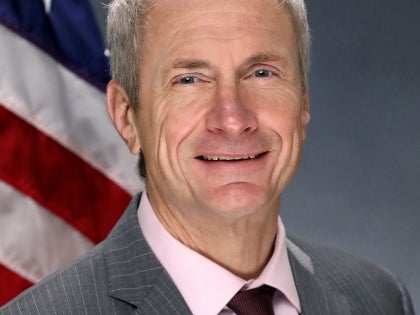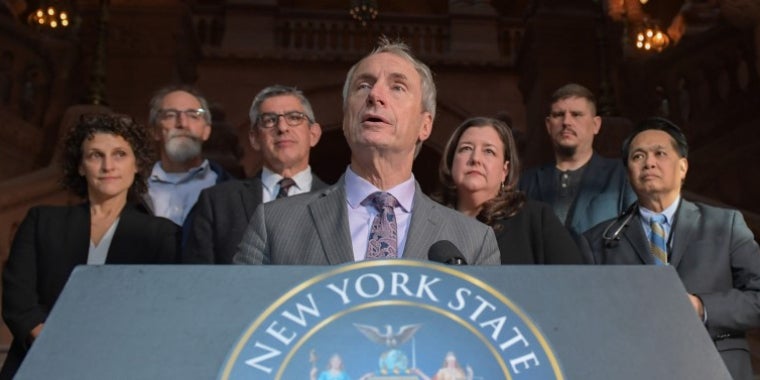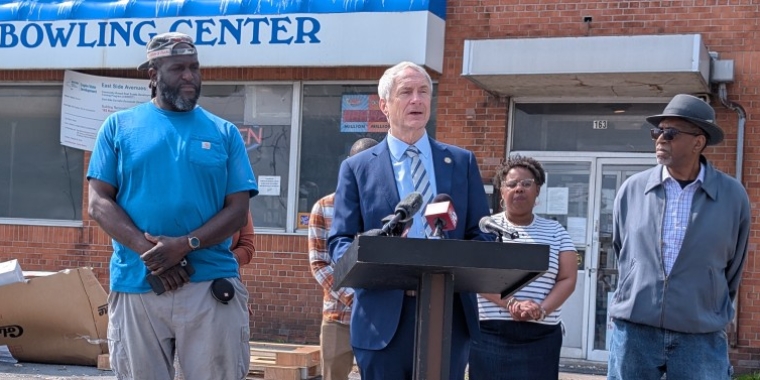
Senator Sean Ryan, Allies Urge Governor Hochul To Sign Noncompete Ban
November 28, 2023

Senator Sean Ryan speaks at an Albany press conference about banning noncompete agreements, Nov. 28, 2023
ALBANY – Today, November 28, 2023, New York State Senator Sean Ryan was joined by a wide range of advocates urging Governor Kathy Hochul to sign his legislation (S.3100A/A.1278B) to prohibit employers in New York from restricting their employees’ future employment options through the use of noncompete agreements.
*Click here for a video recording of the press conference*
The bill, which passed both houses of the New York State Legislature in June, has recently been met with a dark money opposition campaign and significant lobbying efforts from the large corporations that stand to lose a competitive advantage they have long enjoyed over small businesses in New York. In a press conference at the New York State Capitol, speakers from the Screen Actors Guild - American Federation of Television and Radio Artists (SAG-AFTRA), the American Economic Liberties Project/Fight Corporate Monopolies (AELP/FCM), the National Employment Lawyers Association, New York (NELA NY), the National Employment Law Project (NELP), and the New York State Academy of Family Physicians outlined the harms caused by noncompete agreements and cleared up misconceptions about a ban being spread by opponents of the bill.
Notably, despite critics’ repeated claims that prohibiting noncompete agreements would put companies’ trade secrets at risk, the bill specifically protects the use of confidentiality agreements and nonsolicitation agreements, leaving businesses with multiple mechanisms to protect proprietary information without unnecessarily limiting their employees’ mobility.
A 2019 survey by the Economic Policy Institute and Cornell University estimates that a staggering 44.2% of New York workplaces subject employees to noncompete agreements. In May, Senator Ryan, chair of the Senate Committee on Commerce, Economic Development and Small Business, conducted a joint public hearing with Senator Jessica Ramos, chair of the Senate Committee on Labor, to investigate the impacts of noncompete agreements on New York State. The personal experiences and professional expertise provided as testimony outlined the overwhelmingly detrimental effects that noncompete agreements have on individuals, businesses, and the economy in New York.
How Noncompetes Harm Workers
When an employee wants to find a job that is a better fit for them or pays better than their current job, a noncompete agreement can force them to make the difficult choice between changing careers or staying in the job they want to leave. By removing the primary mechanism workers have to earn higher wages, noncompete agreements depress wages and prevent economic mobility. Even when a noncompete agreement is unlikely to be enforceable by law, it still often serves as a functional restriction on any employee who does not have the time or financial resources to fight it in court.
Experts have found that noncompete agreements have a disparate impact on women and people of color, and that their continued use is maintaining the gender and racial wage gap. A 2021 study found that while noncompetes reduce earnings for white men by approximately 3.2%, they suppress pay for other demographic groups by between 3.7% and 7.7%. This disparate impact is due in part to the fact that women and people of color are often less able to take on long commutes to escape the geographic reach of noncompete agreements, and often feel less able to attempt to negotiate or violate them.
How Noncompetes Harm Small Businesses
Numerous studies have shown that noncompete agreements are not only detrimental to the workers who sign them; they also have a negative effect on small businesses and the economy as a whole. By preventing workers from seeking employment at entities that may be a better fit for them, noncompete agreements limit the pool of potential applicants in the labor market. This can make it more difficult for businesses to find qualified employees even when they offer better-than-average wages and benefits.
How Noncompetes Harm Consumers
Noncompete agreements have a detrimental impact on consumers as well. They are prevalent in the medical field, for instance, where they often disrupt continuity of care when a medical provider is forced to move many miles away from their patients in order to change employers. Additionally, by limiting budding entrepreneurs’ ability to leave their jobs to start new businesses, they stifle competition, which leads to fewer options and higher prices for consumers. This has the added effect of either stunting innovation or forcing fledgling companies out of New York and into states like California, where an 1800s-era noncompete ban is often credited for the rise of Silicon Valley.
Senator Sean Ryan said, “Mountains of evidence tells us that noncompete agreements cause harm across the entire economic landscape, and that banning them will be a boon to workers, small businesses, and the economy as a whole. Wall Street billionaires also understand this, which is why they have resorted to a big-money fearmongering campaign and frantic lobbying to try to maintain their competitive advantage over New York’s small businesses. This is a fight between Main Street and Wall Street, and I am proud to stand on the side of the workers and small businesses on which New York’s economy is built.”
Rebecca Damon, SAG-AFTRA Executive Director, New York Local, Labor Policy, and International Affairs, said, “Prohibiting noncompetes in New York State will amplify economic equity in the state and continue to highlight NY’s leadership in worker rights. Studies have shown that noncompetes have an outsized negative impact on women in the workforce, at all salary levels. It is especially nefarious as women pursue executive and entrepreneurial opportunities. The threat of legal action in these clauses discourages women from seeking better opportunities to increase their compensation and their responsibilities. This directly impacts equity in the workplace. Noncompetes have no place in New York at any salary level.”
Helen Brosnan, Executive Director of Fight Corporate Monopolies, said, “New York is just one step away from passing a transformative ban on noncompete agreements and bringing economic freedom to working people across the state. Unsurprisingly, corporate lobbyists are desperately fighting this bill to persuade Governor Hochul to block it. What we know, and what they fear, is that this extremely popular piece of legislation would bolster wages, bring down costs for consumers, and give workers and small businesses more power. The Biden administration has made banning noncompete agreements a pillar of their economic agenda, and state legislatures across the country have followed suit. Now, Governor Hochul must act. We are grateful for Senator Ryan’s effort to pass this momentous legislation, and we are urging the Governor to stand with workers, sign the bill immediately, and improve the lives of millions of working New Yorkers.”
Pat Garofalo, Director of State & Local Policy at the American Economic Liberties Project, said, “Governor Hochul can secure a monumental win for workers, consumers, and small businesses by seeing past corporate America’s spin campaign and standing with the Biden administration to ban noncompete agreements. As we’ve seen from extensive research and heard from workers’ lived experiences, restrictive noncompete agreements push down wages, degrade working conditions, stifle small business innovation, and ultimately raise prices for consumers. We’re thankful for Senator Ryan’s leadership to eliminate these coercive contracts, and hope Governor Hochul quickly signs his bill into law. Millions of workers, entrepreneurs, everyday consumers, and the New York economy overall will be better off because of it.”
Miriam Clark, Chair of the Legislative Committee of NELA NY, an organization of more than 350 lawyers representing employees, said “This bill will ensure that NY workers at all levels, like the workers of California, obtain freedom of economic movement, benefiting both employees and the economy at large.”
Paul Sonn, State Policy Program Director at the National Employment Law Project, said, “Noncompetes are some of the most abusive and unnecessary employment practices. They drive down worker pay and impede mobility, especially for women and people of color. They stifle start-ups and new business formation in our economy. And when applied to doctors and nurses, they’re a major barrier to access to healthcare. That’s why President Biden and bi-partisan coalitions in Washington are calling to ban them completely. Governor Hochul should side with New York’s workers by signing this legislation – and should reject Wall Street and the Business Council’s shameful attempt to get this bill vetoed.”
Dr. Jose David, past-President of the NYS Academy of Family Physicians, said, “The disparity in bargaining power between large employers and individual physicians is the foundation upon which inequitable provisions in employment contracts are based. Patients rely upon their relationship with their physician and employment contracts which restrict physician access or clinical discretion are a barrier to continuity of that relationship. Noncompete clauses ignore the needs of patients to protect the business interests of employers. We commend the bill sponsors for bringing this critical patient protection bill forward and urge Governor Hochul to sign it into law.”
